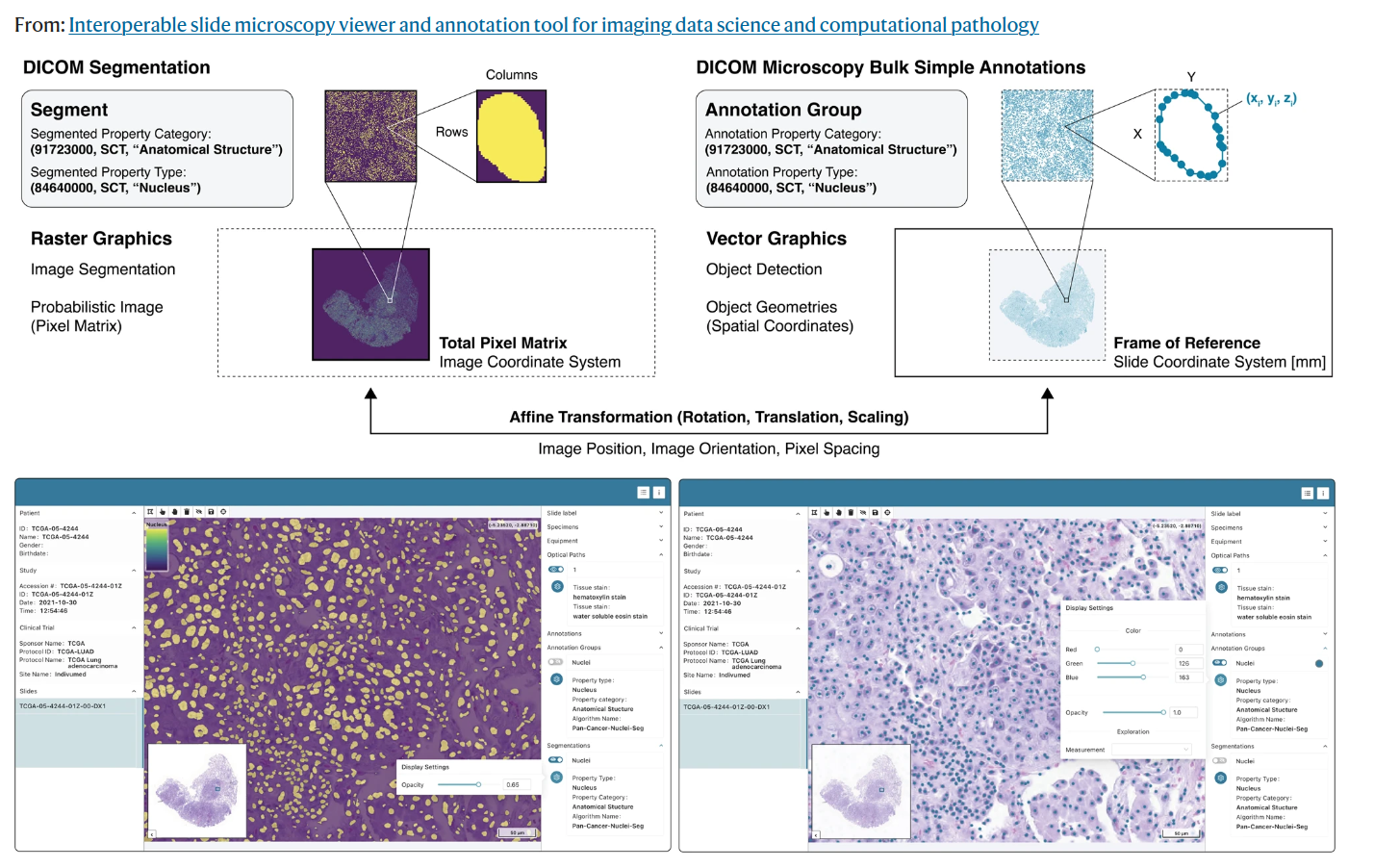 NA-MIC Project Weeks
NA-MIC Project Weeks
Back to Projects List
Tutorials on working with DICOM annotations in pathology whole-slide images
Key Investigators
- Daniela Schacherer (Fraunhofer MEVIS, Germany)
- Chris Bridge (MGH, USA)
- David Clunie (PixelMed, USA)
- Curtis Lisle (KnowledgeVis, USA)
- Maximillian Fischer (DKFZ, Germany)
- Andrey Fedorov (BWH, USA)
Project Description
This project aims to create tutorials on how to work with DICOM annotations in pathology whole-slide images (WSIs). We will focus on nuclei annotations stored as DICOM Microscopy Bulk Simple Annotations and compute nuclei density (cellularity) on tile-level from them. The computed cellularity values are then stored as DICOM parametric maps.
Objective
- Objective A: Have a Colaboratory notebook ready that at least reads DICOM Microscopy Bulk Simple Annotation files (currently from a Google Storage bucket, ideally later from the IDC directly) and computes cellularity values.
- Objective B: Encode computed cellularity values as DICOM parametric map that can be stored back to the IDC.
Approach and Plan
- Testing and documentation of the current capabilities
- Establish a repository of test samples that will contain standard-compliant examples of bulk annotations (different number of points, 2D vs 3DSCOORD), segmentations (binary and fractional) and parametric maps (floating point and integer).
- Share code samples that were used to generate the examples above
- Test different combinations of Slim viewer, DICOMweb backend (Google, dcm4chee, orthanc) and test samples to understand what is supported by various components (i.e., perhaps only 3DSCOORD is supported by Slim, there may be limits on maximum size of SQ in Google Healthcare)
- Development of the tutorial
- Investigate nuclei annotations for plausibility
- Read nuclei annotations
- Efficiently compute cellularity values
- Encode cellularity values as DICOM parametric maps
Progress and Next Steps
- We created different DICOM stores in Google (re-used the Google Cloud platform (GCP) project idc-external-031):
- Single 2DSCOORD bulk annotation file and corresponding WSI: DICOMweb endpoint
- 2D vs. 3D and point vs. polygon bulk annotation files and corresponding WSI: DICOMweb endpoint
- Different sizes of DICOM bulk annotation files: DICOMweb endpoint
- Single binary segmentation plus simple bulk annotation file: DICOMweb endpoint
- Single binary segmentation file produced by Curt Lisle in the context of his project: DICOMweb endpoint
- Single fractional segmentation plus simple bulk annotation file: DICOMweb endpoint
- Parametric maps: DICOMweb endpoint
- Working example from Chris: binary segmentation plus simple bulk annotation file: DICOMweb endpoint
- We tested and documented current capabilities of reading and visualizing annotations
- Results are summarized here
- We implemented code for cellularity computation and prepared a Colab notebook on which further work will be done following the project week.
Illustrations

Background and References
- Github page Slim viewer
- Slim viewer instance provided by Andrey Fedorov: slim-viewer-andrey
- Slim deployment tutorial - seek feedback from Max and Curt
- WIP Code under development by Chris Bridge to convert annotations from to DICOM ANN/SEG: Github repository
- Some example Parametric DICOM Map and the conversion code as Docker container from Max Fischer.